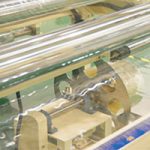Specifications
PVA Film :
| Item | PVA Optic Film WW-AF-75 105 | Low Temperature water soluble film | |
| Length | 1500+20m | / | |
| Thickness | 75±2μm | / | |
| Width | 1050±5mm | / | |
| Light transmittance | ≥90% | / | |
| Haze | ≤1.0% | / | |
| Draft ratio | ≥500%(wet process) | ≤200% | |
| Tensite strength | ≥60Mpa(wet process) | ≥30Mpa | |
| Dissolution time | N/A | ≤2min(15℃水) | |
| Packing | wooden box | wooden box | |
| Use | Optical film,Production of all kinds of poarizing plate | Products such as plastic,ceramic water transfer printing | |
Packing& Storage
| Packing | In wooden box or per customer needs | |||||||
| Storage | Rolls in carton | |||||||
| Shipping | Keep in a dry, cool place. | |||||||
Frequently Asked Questions
What is PVA Film and What is PVA Film Used for ?
PVA film (PVA film for short) is made from PVA , which is dissolved, extruded, coated and dried. The product has a wide width of 1.6 meters, a thickness of 30-75μm, and has good mechanical and optical properties. After the optical film is combined with cellulose triacetate film (TAC film), it is used in the manufacture of TN, STN, TFT and other liquid crystal display and polarizing glasses. Low temperature water soluble film can be used for water transfer printing on the surface of plastics, ceramics and other products.
What are the Advantages of PVA Film?
Polyvinyl alcohol film is a green environmental protection functional material with polyvinyl alcohol as the main body, additives such as modifiers and other additives, processed by special technology, and can be completely degraded by microorganisms in soil. It can be degraded into carbon dioxide and water in a short time, and has the effect of improving land.
The Printability of PVA Film
PVA film has excellent water color and ink printability, which is the existing plastic film can only be printed with ink incomparable advantages, can be used for water transfer printing, such as: glass, ceramics, electrical shell, auto parts and other irregular surface color printing. At the same time, PVA film has strong polarity, can be printed without electrical spark treatment, and is widely used in special printing industry, such as water transfer film substrate.
The Oil Resistance and Solvent Resistance
PVA films have excellent oil resistance (vegetable oil, animal oil, mineral oil), resistance to organic solvents and carbohydrates. However, strong alkali, strong acid, chlorine free radical and other substances that can chemically react with PVA (such as borax, boric acid, some dyes, etc.), such substances are not suitable for PVA film packaging.

